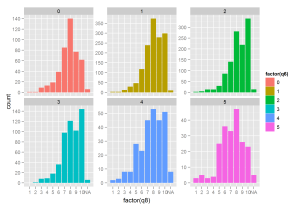As the internet becomes a larger and larger proportion of our everyday lives, our habits in front of our computer become increasingly important. Just fifty years ago, who would have thought there would be entire cottage industries would be devoted to ergonomics and our comfort in an increasingly sedentary lifestyle? As Hulu comes bridge the divide between computer and television into one entertainment platform and the internet becomes more and more vibrant and engaging place, we will undoubtedly reexamine the evolution of the internet and browser platform. Just as important physical comfort, even slight gains in efficiency in broswer/internet use will be compounded greater and greater amounts of time in front of the desktop. I attempt to examine the relationship between self-reported proficiency, amount of time spent in front of the computer, and extension use in Firefox.
Mozilla Labs and the Metrics Team, together with the growing Mozilla Research initiative, are hosting a Open Data Visualization Competition based on Test Pilot data. This is my second attempt after sorting through demographic, use, and survey data. First, the distribution of the self-reported computer proficiency is not normally distributed. There was a much greater number of individuals selecting a high proficiency on the internet than those selecting a low number. Although I believe this is definitely a biased population (the individuals opted in, implying they understand how to opt in and care for the development of Firefox), I also think there is truth in the saying “90% of college graduates believe they graduated in the top half of their class”. There are negligible differences in responses to the amount of time spent using Firefox and age distribution. When faceted both by age of the respondent and self-reported number of hours in front of the computer, the distribution remains roughly the same. However, there are substantive differences in terms of use of extensions and the types of activities performed – perhaps enthusiasm is more important than raw amount of time.
First, individuals self identifying as being more proficient are also more likely to use a greater number of Firefox extensions. This is to be expected as Firefox prides itself on having a vibrant sandbox of developers and a large array of functional and entertaining extensions. I would guess that more proficient users would take the time to create a more customized and optimized experience with the internet and this begins at browser extensions. I would also venture to guess that at least a portion of the sample includes web developers and individuals intimately involved in the development of Firefox (Who needs 100+ extensions?!?) and they would self-identify as professional users.
The internet is not a one-way mirror. As we use the internet, the internet changes and influences our behaviors. There is also a strong positive between the self reported proficiency and the number of activities one performs on the internet. In the survey, one of the questions on the survey asks how individuals use the internet, binned into large categories of activities ranging from social networks to online shopping. As users become more proficient, perhaps they discover a greater variety of functions that can be performed online.
Finally, more frequent users use the internet for a great number of reasons. This is intuitive as to use the internet for more functions, more time would be spent in front of the computer. As entrepreneurs continue to discover and create new ways for the internet, inevitability more and more of our life will be tied to our online personas and internet use. As such, the browser experience is vitally important. (Carry on Mozilla!)






